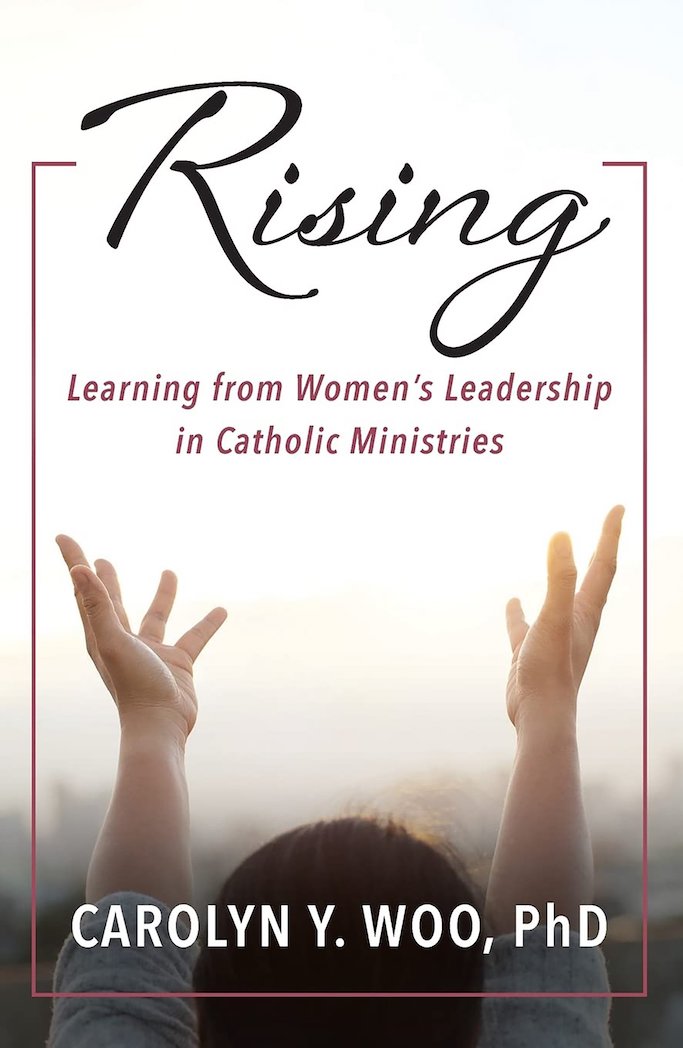“Rising: Learning from Women’s Leadership in Catholic Ministries” by Carolyn Y. Woo. Orbis Books (Maryknoll, New York, 2022). 272 pp., $21.
The conversation around women’s leadership in the Catholic Church usually follows a predictable direction. Citing the closure of the priesthood to women, many argue that the Church does not believe its own theology about the equal dignity of men and women, nor does it value or trust women with real decision-making and responsibility.
Carolyn Woo, retired president and CEO of Catholic Relief Services, takes this misperception head-on in her new book, “Rising: Learning from Women’s Leadership in Catholic Ministries.” It is a text that makes the case that a Roman collar is not necessary for leadership by weaving together the Church’s theology, personal anecdotes and testimonies of Catholic women in an array of leadership positions.
Yet Woo’s book is not a pie-in-the-sky manifesto about how women are empowered wholesale by the institutional Church, nor does it gloss over real, pressing areas for improvement.
Instead, it is an honest look at the experience of women who hold leadership positions – including the opportunities they’ve been given and the challenges they face in predominantly male spaces – as well as a plea to invest in the next generation of women who are disaffiliating from the Church in record numbers.
Woo’s book is aptly titled for two reasons: It draws upon lessons she and others have learned from holding positions of authority. Second, it could easily serve as a reference guide for those who oversee or employ women in leadership positions or for newly hired female leaders.
Since she is the former dean of the University of Notre Dame’s Mendoza College of Business and a woman who holds a doctorate in strategic management, it’s no surprise that Woo’s book is meticulously organized. In an attempt to make a broad topic like women’s leadership digestible, Woo offers the reader a four-part guided tour through the landscape.
Part I tackles several broad topics: misperceptions about women’s leadership, such as those that posture that there are no meaningful opportunities to lead or that church teaching does not affirm the need for women leaders; attributes of Catholic women leaders, most notably their care and concern for their staff as people and their deep desire to be of service; and the challenges that women face in positions of authority and responsibility, usually as outsiders.
Any woman who has been in this position will relate to Woo’s stories about learning male modes of communication and her decision to humbly but strategically deploy male subordinates to move things down the field.
In Part II, Woo draws heavily from her own experience in the classroom and workplace by detailing the capacities she believes are necessary for leadership. Here she highlights just how valuable are female leaders who bring both a faithful commitment to Catholicism and real-world knowledge and skills across a breadth of industries and fields.
In Parts III and IV, Woo offers the stage to 16 other women leaders who share personal testimonies about work that they do for the Church, why they do it and what it looks like. The contributions are compelling for their variety as well as their honesty. The challenges are real: pastors dismissing young, bold women leaders for “not being matronly enough” to do Church work; balancing the needs of family with professional aspirations; having to learn to fundraise on the fly.
Though the women represent fields from health care to communications to management, and though they prioritize different parts of the Church’s mission, they are all are deeply motivated and filled with abiding hope in the Church and the person of Jesus Christ.
Woo’s assessment of the current landscape of women’s leadership is fair and balanced. She commends the Church, especially the last three popes, for teaching and advocating for women’s leadership.
But she is also frank with what’s missing: “The obstacle lies in the lack of change. Inertia is fed by feeble challenges to current structures and the passive foot dragging that cripples substantive action behind intentions.” In other words, a little less conversation, a little more hiring.
In making this case, she does part ways with Pope Francis who says that there is still a need for a renewed “theology of women” and expresses some frustration at St. John Paul II’s writings on the “feminine genius” for elevating women in such a way that undercuts the need to simply get them to the decision-making table.
But given Pope Francis’ most recent “motu proprio” decoupling sacramental ordination from certain areas of Vatican governance, and in light of sweeping cultural changes and confusion about what it means to be a woman, perhaps a modest addendum is in order for a future publication.
All in all, “Rising” is a thorough assessment of women’s leadership in the Catholic Church, from what is taught to what is lived. It will serve women leaders and their male counterparts for years to come.
Also of interest: “Catholic Leadership for Civil Society: A Practical Guide on Authentic Lay Leadership” by Cristofer Pereyra and Erin Monnin. CLCS Publishers (Phoenix, 2022). 109 pp., $14.95.
Ureneck is a communications professional who served as the executive director of communications for The Catholic University of America and was the founding executive director of the Given Institute, a nonprofit dedicated to the formation of women leaders for the Catholic Church. She writes the “Finding God in All Things” column for Catholic News Service.

